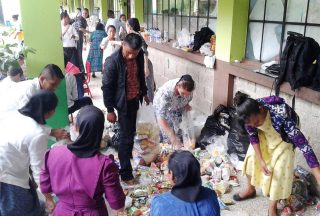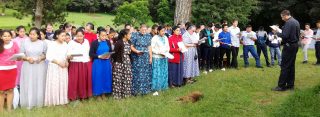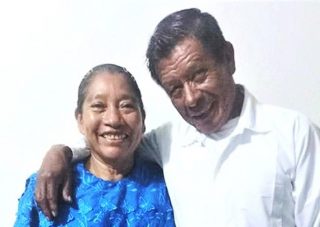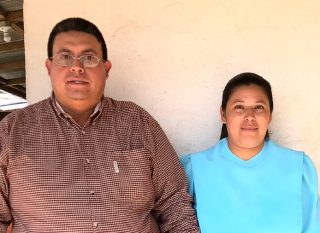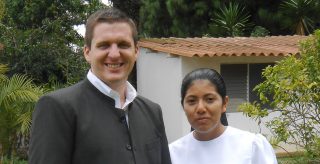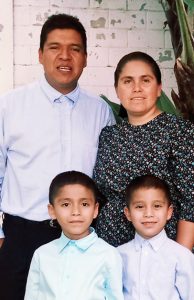- Sorting relief goods for volcano eruption victims.
- Singing in the park
Youth Institute
Youth Institute 2018 was held the last week of June in Sumpango, Guatemala. It was a three-day event that started midday Tuesday and ended Thursday evening. About 100 young people from various regions of Guatemala attended.
On Tuesday afternoon Donaldo Alvarez started with a welcome, and then Larry Martin had several activities planned to break the ice and get everyone involved. Chente Mejia from Costa Rica had an evangelistic evening message. Brother Chente was our guest speaker for the week, and he shared each evening as well as during the day.
Wednesday began with a topic first thing in the morning, followed by a topic on the value of prayer. Then the youth divided into groups, each with a leader, for a time of sharing and prayer. The group sharing was encouraging, as the Christian and non-Christian young people alike shared honestly about struggles they faced.
After lunch, all the youth piled into two buses to head to Alotenango, a small town near the Volcano Fuego that had erupted rather violently about three weeks earlier. Lava flows from the volcano had caused major destruction to a few small towns near the foot of the volcano, and recovery efforts were in full steam. The youth went to help sort food to be donated to the victims of the eruption. Among other items, there were beans, rice, cooking oil, juice packages, milk, and oatmeal to sort through. They checked expiration dates, discarding the bad and saving the good. Then they returned to the farm for supper and another evening message by Brother Chente.
Thursday was similar to Wednesday: two sessions in the morning, and time for sharing and prayer before lunch. The youth piled into the buses once again and headed to Florencia, a park on the way to Antigua, where lunch was grilled and served. Several games were planned, and a good bit of singing was done.
Thursday evening Brother Chente shared the final message of the institute. Three youth responded to the invitation afterward. They are Derik from Oratorio, Doris from Bella Vista, Petén, and Alanis from Mixcolojá. Derik is a grandson of Rafael Segura, a well-known minister in MAM. Both his parents are church members, as well as a younger sister. Doris has been regularly attending the Santa Rosita church, which is not far from Bella Vista. Alanis is studying in Quiche.
Pray for the future of the Youth Institute. One of the greatest struggles in our Guatemalan churches is keeping our youth. Youth Institute is one effort among many to instill in them that burning desire to serve the Lord, no matter what; to call the lost to a saving knowledge of Christ; to develop a vision, a much-needed conviction, and a deeper understanding of God’s Word in our young, faithful Christians.
Pray for our youth, especially the three that responded at the institute. The pressure is intense, the stakes high. The pressures from family, friends, schoolmates, and society is to live it up. Some non-Christian young people are interested in the church, but are held back by the realization that they would be unique, different, the first of their kind among their peers. Loneliness among our Christian youth is common. Some are the only Christian young person in their family, even their church. Our prayers are vital.
~ Aaron King
Encouraged in the Lord
For we would not, brethren, have you ignorant of our trouble which came to us in Asia (Guatemala?), that we were pressed out of measure, above strength, insomuch that we despaired even of life (2 Corinthians 1:8).
Do today’s missionaries ever experience being “pressed out of measure” beyond what they feel their strength can endure? You can be assured it happens. Most missionaries experience discouragement and loneliness that can take them beyond their strength, in some cases causing burnout, and sometimes causing them to quit.
Many things contribute to discouragement. Separation from friends and family can be tough. Sometimes it’s the dirt, the heat, and the danger. Sometimes it’s the pressure of people; locals wanting frequent help, too many visitors too fast—or perhaps no visitors at all.
Sometimes equipment doesn’t work, or the phone is out of order, the vehicle broken down, the generator just quit, or the allowance just doesn’t reach around. Unfortunately, one of the toughest discouragements that come in mission experience is stress in relationships with other missionaries.
But perhaps the most serious and least considered reason for discouragement is a lack of results. Missionaries, like all people, like to see the fruit of their labors. In the case of MAM, that likely won’t be a big paycheck or a carefully manicured property. What most would like to see is a growing, maturing congregation of national believers. Our goal is indigenous churches. To reach this goal, souls need to come to Jesus, mature in Jesus, then lead others to Jesus. This is a huge task and takes a tremendous amount of time and effort.
Church planting is different than many of the other ways of serving mankind. When Christians serve their fellow man in physical ways, the results are often almost immediate: wells get dug, houses get built, children learn, the sick receive medicine, the hungry are fed, the needy are clothed.
Many times the preaching of the Gospel is less tangible. Oh, yes, people gather and the Word is preached, often over a few years. Several souls will respond, and you hope . . . But it takes time, prayer, and years of effort to see men and women become leaders and examples for others to follow. As those years go by, there are many ocasions to feel pressed beyond measure.
To top it off, sometimes souls that once showed great promise fall away or quit coming. Perhaps even brethren turn against you. (Guatemalans don’t like to be told about their sin any better than Americans do.) Maybe the young man you hoped could one day serve as pastor has fallen into serious moral sin or is showing signs of lack of financial integrity. It’s no wonder that the missionary starts to feel depressed.
This challenge should concern all of us who care about the kingdom of Christ. We need missionaries who have vision, who love Christ, and who are willing to carry on the work for years. We need them to stay encouraged in the Lord. And herein lies the secret. We should write, we should call, we should visit, and we must pray. But above all, what each missionary needs is a meaningful relationship with God.
While results encourage anyone, we must not work for results primarily. We belong to God; we are co-laboring with God. Our call and challenge is to please Him in all things.
So as we pray for missionaries, let’s do our best to encourage them in the Lord. Pray that their hearts will be turned toward God each day. Share insights, books, messages, and thoughts in an uplifting spirit. Inquire about prayer requests and give encouragement concerning their relationship with God. Because every time they feel God’s smile of approval and the strength of His grace, though they have suffered scarcity of results, they will feel new strength from Him. This is the sure antidote to burnout, to be strengthened in the power of His might. They that wait upon the Lord shall renew their strength (Isaiah 40:31a).
~ Duane Eby
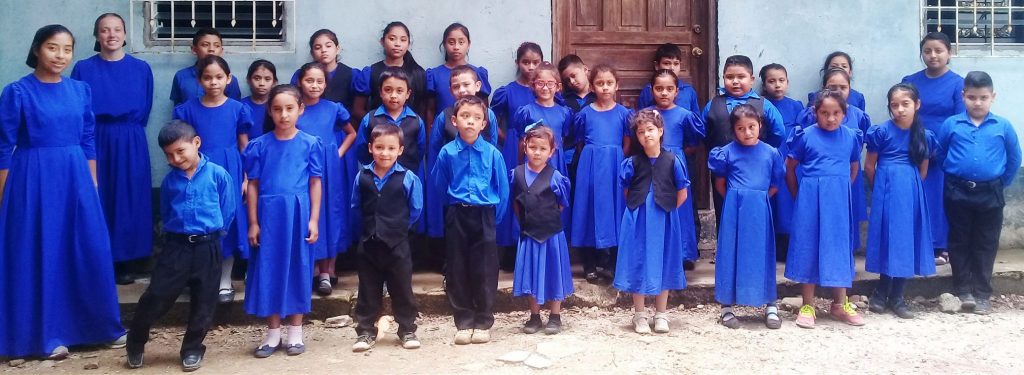
The students in front of the Oratorio church building.
School in Oratorio
The Mennonite school in Oratorio, named “Rios de Agua Viva” (Rivers of Living Water), has been in operation for more than twenty years. This year the school has three classrooms and nearly thirty students from preschool to sixth grade, more than double last year’s number.
The three main teachers are two daughters and a daughter-in-law of bishop brother Isaías Muñoz, and are members of the church in Oratorio. Lidia teaches the youngest students and the largest class: preschool, kindergarten, and part of first grade. Benedilda also teaches some of the first grade as well as grades two and three. Arlin teaches grades four through six. This is Benedilda’s first year of teaching; the other two have taught for several years.
In its beginning, the school was only for students from church families, but now some from the community attend as well. Of the twenty-nine students presently in school, only two are from local church families. Several students are grandchildren of a church sister, and some of them often attend services with their grandma. Among the requirements for attending school is that students are to attend Sunday school at least twice a month.
The school is at the same location as the church building in Oratorio.
A typical school day starts with all the students together in the chapel for a devotional time. This includes singing, prayer, and a Bible story. Following this, the students go to their respective classrooms. Recess is around ten o’clock, and generally some sort of refreshment is served—beans and tortillas, cereal and milk, a fruit mixture, soup, etc. The school day ends at 12:30 p.m.
The school year in Guatemala starts in January and goes through October. Tests are given the last week of every quarter of the school year. Normally the children give a program at the end of the school year.
The school does not offer education beyond sixth grade. One option for studying beyond this point is by correspondence course. This year a small group of students have been meeting in the afternoons and studying this way. One of the teachers has been working with them in the afternoons.
Would you join us in prayer for the school in Oratorio? Please pray for the teachers in their great responsibility in this work. Pray for the students, that as they learn, their lives would be influenced to live in a way that would glorify our Lord Jesus Christ.
~ Twila Miller
- Juan and Micaela Osorio
- Donaldo and Angelica Alvarez
- Craig and Aura Martin September 1, 2017
- Jeremías and Elida Mendez
Ninety-Nine Weddings
In 1985 Brother Victor Ovalle began a ministry that he has continued for over thirty years—performing the legal marriage ceremony required by Guatemalan law. In Guatemala a simple church wedding is not officially recognized by the civil government, and those who wish to get married in the church need to have both a religious wedding and a civil wedding. Most ordained pastors are not able to do this without a special authorization, so when Brother Victor got that authorization from the government, he was able to perform both the civil and the church wedding.
Brother Victor was given a book to make out a legal document for every wedding he performed. The book had space for one hundred weddings. Last year he filled the last page of the book. Only one page was voided, which means that he has performed ninety-nine government-recognized weddings.
Brother Victor considers this a ministry to help both Christian and non-Christian young people to get married. He has married couples from MAM churches and non- Mennonite churches. He has even married non-Christian couples; it is better to marry than to live in fornication.
Many young people don’t see the need to get married and just begin living together. Perhaps they don’t want to go to the lawyer’s office, or perhaps they don’t have the money to pay him. They have more confidence in a church pastor, and he doesn’t charge them for the service. He can come to their house, or they can even go to his to perform the civil wedding.
It has been a blessing for Brother Victor to work in this ministry. In 90-95 percent of the weddings he has performed, the couples have been faithful to their commitment.
Now that his book is full, he has applied for another to continue this ministry, but there are more requirements now than there were when he got the first one. So he is still waiting to see if he will be able to get it.
Marriage is honourable in all, and the bed undefiled: but whoremongers and adulterers God will judge (Hebrews 13:4).

